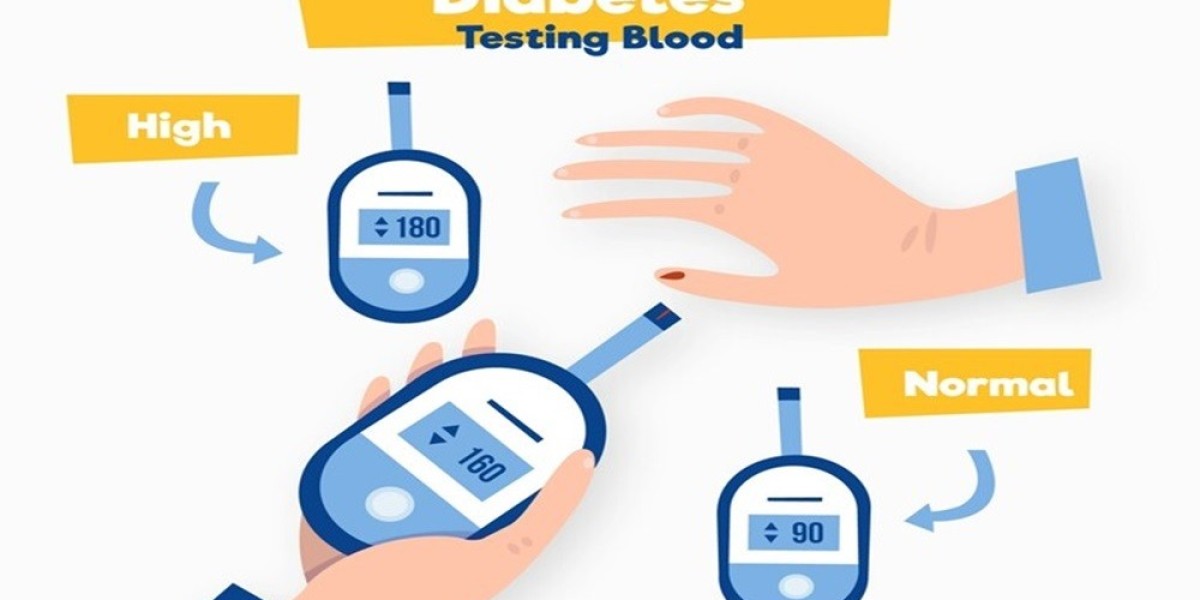Introduction:
High blood sugar, also known as hyperglycemia, is a condition that affects millions of people worldwide. Whether you're living with diabetes or simply striving for optimal health, managing your blood sugar levels is crucial for overall well-being. In this comprehensive guide, we'll explore various strategies to help you effectively manage high blood sugar and live a healthier, more balanced life.
Understanding High Blood Sugar:
Before delving into management strategies, it's essential to understand what high blood sugar is and how it affects the body. Blood sugar, or glucose, is the primary source of energy for our cells. However, when blood sugar levels rise too high, it can lead to a host of health complications, particularly for individuals with diabetes.
When you consume food, your body breaks down carbohydrates into glucose, which enters the bloodstream. In response, the pancreas releases insulin, a hormone that helps transport glucose from the bloodstream into the cells to be used for energy. However, if the body either doesn't produce enough insulin or becomes resistant to its effects, glucose remains in the bloodstream, leading to high blood sugar levels.
Symptoms of high blood sugar may include increased thirst, frequent urination, fatigue, blurred vision, and slow wound healing. If left unmanaged, high blood sugar can cause serious complications such as nerve damage, kidney disease, and cardiovascular problems.
Now that we have a basic understanding of high blood sugar, let's explore some effective strategies for managing this condition and promoting overall health and well-being.
Dietary Management:
One of the most crucial aspects of managing high blood sugar is maintaining a healthy diet. A balanced diet rich in whole foods can help regulate blood sugar levels and prevent spikes. Here are some dietary tips to consider:
- Focus on Complex Carbohydrates: Choose carbohydrates that are rich in fiber, such as whole grains, fruits, vegetables, and legumes. These foods are digested more slowly, leading to gradual increases in blood sugar levels.
- Monitor Portion Sizes: Pay attention to portion sizes to avoid overeating, which can cause blood sugar spikes. Use measuring cups or visual cues to help you estimate appropriate portion sizes.
- Limit Sugary Foods and Beverages: Minimize your intake of sugary snacks, desserts, and sugary beverages, as they can cause rapid spikes in blood sugar levels.
- Include Lean Proteins and Healthy Fats: Incorporate lean proteins such as poultry, fish, tofu, and legumes into your meals, as well as healthy fats like avocados, nuts, and olive oil. These nutrients help slow the absorption of carbohydrates and promote satiety.
- Stay Hydrated: Drink plenty of water throughout the day to stay hydrated and support optimal blood sugar levels. Limit your intake of sugary drinks and opt for water, herbal tea, or sparkling water instead.
In addition to making healthy food choices, regular physical activity is essential for managing high blood sugar and improving overall health. Exercise helps lower blood sugar levels by increasing insulin sensitivity and promoting glucose uptake by the muscles. Aim for at least 30 minutes of moderate-intensity exercise most days of the week, such as brisk walking, cycling, swimming, or dancing. Incorporating strength training exercises into your routine can also help improve insulin sensitivity and promote weight management.
Monitoring Blood Sugar Levels:
Regular monitoring of blood sugar levels is crucial for effectively managing high blood sugar. By keeping track of your blood sugar readings, you can identify patterns and make necessary adjustments to your diet, medication, or lifestyle habits. Your healthcare provider can recommend an appropriate monitoring schedule based on your individual needs and health goals. In addition to traditional blood glucose monitoring methods, continuous glucose monitoring (CGM) systems are becoming increasingly popular, providing real-time data on blood sugar levels throughout the day.
Medication and Insulin Therapy:
In some cases, lifestyle modifications alone may not be sufficient to control high blood sugar levels, and medication or insulin therapy may be necessary. There are several classes of medications available to help lower blood sugar levels, including oral medications such as metformin, sulfonylureas, and thiazolidinediones, as well as injectable medications like GLP-1 receptor agonists and SGLT2 inhibitors. Your healthcare provider will work with you to determine the most appropriate treatment plan based on your individual needs and medical history. If you require insulin therapy, it's essential to learn how to administer insulin properly and monitor your blood sugar levels closely to prevent hypo- or hyperglycemia.
Stress Management and Sleep:
Managing stress and prioritizing adequate sleep are often overlooked but critical aspects of managing high blood sugar. Chronic stress can contribute to elevated blood sugar levels by triggering the release of stress hormones like cortisol, while poor sleep can disrupt hormone regulation and increase insulin resistance. Incorporating stress-reducing activities such as mindfulness meditation, deep breathing exercises, yoga, or spending time in nature can help promote relaxation and improve blood sugar control. Additionally, aim for 7-9 hours of quality sleep each night to support overall health and well-being.
Blood Sugar Monitoring and Regular Checkups:
Regular monitoring of blood sugar levels is crucial for effectively managing high blood sugar. By keeping track of your blood sugar readings, you can identify patterns and make necessary adjustments to your diet, medication, or lifestyle habits. Your healthcare provider can recommend an appropriate monitoring schedule based on your individual needs and health goals. In addition to traditional blood glucose monitoring methods, continuous glucose monitoring (CGM) systems are becoming increasingly popular, providing real-time data on blood sugar levels throughout the day.
Medication and Insulin Therapy:
In some cases, lifestyle modifications alone may not be sufficient to control high blood sugar levels, and medication or insulin therapy may be necessary. There are several classes of medications available to help lower blood sugar levels, including oral medications such as metformin, sulfonylureas, and thiazolidinediones, as well as injectable medications like GLP-1 receptor agonists and SGLT2 inhibitors. Your healthcare provider will work with you to determine the most appropriate homeopathic treatment plan based on your individual needs and medical history. If you require insulin therapy, it's essential to learn how to administer insulin properly and monitor your blood sugar levels closely to prevent hypo- or hyperglycemia.
Stress Management and Sleep:
Managing stress and prioritizing adequate sleep are often overlooked but critical aspects of managing high blood sugar. Chronic stress can contribute to elevated blood sugar levels by triggering the release of stress hormones like cortisol, while poor sleep can disrupt hormone regulation and increase insulin resistance. Incorporating stress-reducing activities such as mindfulness meditation, deep breathing exercises, yoga, or spending time in nature can help promote relaxation and improve blood sugar control. Additionally, aim for 7-9 hours of quality sleep each night to support overall health and well-being.
Seeking Support and Education:
Living with high blood sugar can be challenging, but you don't have to navigate it alone. Seeking support from healthcare professionals, homeopathic diabetes educators, and support groups can provide valuable guidance, encouragement, and resources to help you effectively manage your condition. Education is also key to empowerment, so take the time to learn as much as you can about diabetes management, nutrition, exercise, medication, and self-care practices. The more knowledge and skills you acquire, the better equipped you'll be to make informed decisions and take control of your health.
Conclusion:
Managing high blood sugar requires a comprehensive approach that encompasses dietary modifications, regular physical activity, blood sugar monitoring, medication management, stress reduction, adequate sleep, and ongoing education and support. By incorporating these strategies into your daily routine and working closely with your healthcare team, you can achieve better blood sugar control, reduce the risk of complications, and improve your overall quality of life. Remember that managing high blood sugar is a journey, and small, consistent changes can lead to significant improvements over time. Stay committed to your health goals, celebrate your progress, and don't hesitate to reach out for help when needed. Together, we can empower ourselves to live well with high blood sugar and thrive.
Book an Appointment now: https://www.dharmahomoeo.com/book-appointment/
Source: https://bresdel.com/blogs/489788/Managing-High-Blood-Sugar-A-Comprehensive-Guide-to-Wellness








